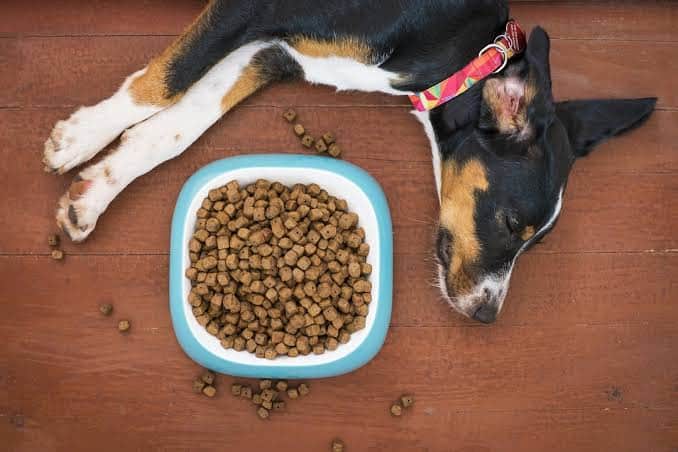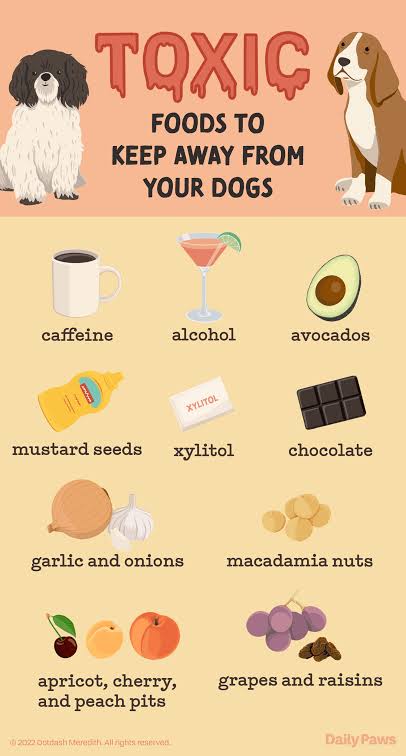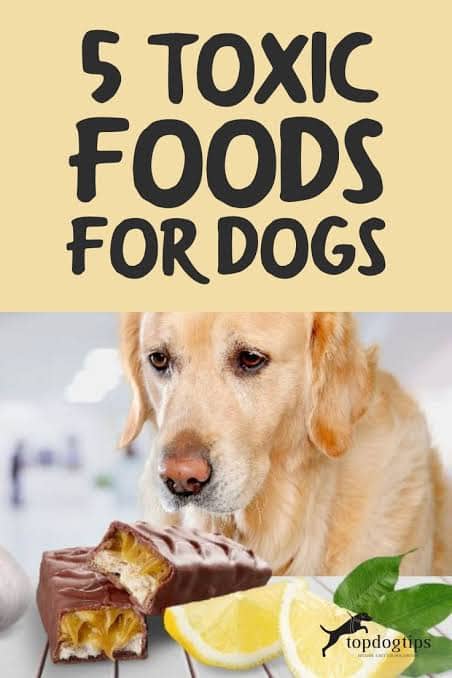Welcome to our comprehensive guide on pet safety! Here, we shall discuss 5 Toxic Foods To Avoid For Dogs. Also, we shall discuss other subtopics like: What Is A Toxic Food For Dogs?, Types Of Toxic Foods For Dogs, Can Dogs Consume Dairy Products?, Can I Give My Dog Peanut Butter?, etc. As devoted dog owners, we understand the paramount importance of keeping our furry friends healthy and happy.
Discovering the dangers lurking in our kitchens is essential for ensuring the well-being of our canine companions. From commonly enjoyed human treats to seemingly harmless ingredients, it’s crucial to be informed about what poses a risk to our dogs.
Join us as we explore five toxic foods that should be strictly off-limits for your beloved pets. This guide goes beyond raising awareness; it equips you with the knowledge needed to safeguard your dog’s health. Let’s embark on this journey of understanding, empowering you to make informed choices for the safety and longevity of your four-legged family members.
What Is A Toxic Food For Dogs?
A toxic food for dogs is any substance that, when ingested, can be harmful or even fatal to them. Common toxic foods include chocolate, grapes, raisins, onions, garlic, avocado, alcohol, and certain artificial sweeteners like xylitol.
These items can lead to various health issues such as kidney failure, gastrointestinal problems, damage to red blood cells, and more. It’s crucial for pet owners to be aware of these toxic foods and ensure they are kept out of reach to maintain the well-being of their canine companions.

Types Of Toxic Foods For Dogs
1. Chocolate
Chocolate contains theobromine, a stimulant similar to caffeine, which dogs metabolize more slowly than humans. As a result, even small amounts of chocolate can lead to theobromine toxicity in dogs, affecting their central nervous and cardiovascular systems.
Explanation Of Theobromine Toxicity
Theobromine, when ingested by dogs, stimulates the release of adrenaline, causing an increased heart rate and potential overstimulation of the nervous system. Dogs metabolize theobromine more slowly than humans, leading to a prolonged exposure and accumulation of the substance in their system. This accumulation can result in symptoms ranging from mild to severe, depending on the amount and type of chocolate consumed.
Types Of Chocolate To Avoid
Not all chocolates pose the same level of risk. Dark chocolate contains higher levels of theobromine compared to milk chocolate, making it more toxic to dogs. Baker’s chocolate is particularly dangerous due to its concentrated theobromine content. As responsible pet owners, it’s crucial to keep all forms of chocolate, especially dark and baking chocolate, well out of reach of our furry friends.
Symptoms Of Chocolate Poisoning In Dogs
Recognizing the symptoms of chocolate poisoning is key to seeking prompt veterinary care. Common signs include vomiting, diarrhea, increased heart rate, restlessness, tremors, and, in severe cases, seizures. If you suspect your dog has ingested chocolate, contact your veterinarian immediately, providing details such as the type and amount of chocolate consumed.
2. Grapes And Raisins
The exact substance in grapes and raisins responsible for their toxicity in dogs is not yet identified, but their ingestion has been linked to acute kidney failure. Even small amounts of grapes or raisins can lead to serious health consequences, with symptoms of kidney failure appearing within 24 hours of ingestion. As responsible pet owners, understanding the potential risks is crucial for safeguarding our canine companions.
Common Products Containing Grapes/Raisins
While it’s widely known to keep whole grapes and raisins away from dogs, it’s essential to be vigilant about other products that might contain these toxic fruits. Snack mixes, baked goods, trail mixes, and certain cereals or granola bars can harbor hidden dangers. Always check ingredient labels, and avoid sharing any food that may contain grapes or raisins with your dog.
Immediate Actions If Ingestion Occurs
If you suspect your dog has ingested grapes or raisins, swift action is crucial. Contact your veterinarian immediately, providing details such as the type and quantity ingested. In some cases, inducing vomiting may be recommended, but it’s essential to follow professional guidance. Monitor your dog for symptoms of toxicity, and seek veterinary care promptly, as early intervention is key to minimizing the risk of kidney failure.
3. Onions And Garlic
Onions and garlic are common ingredients in many households, adding flavor and aroma to various dishes. However, pet owners need to be aware that these kitchen staples can pose a serious threat to the health of their canine companions.
Overview Of The Dangers To Red Blood Cells
Both onions and garlic belong to the Allium family and contain compounds that can be toxic to dogs, particularly affecting their red blood cells. These compounds can lead to a condition called hemolytic anemia, where the dog’s body destroys its own red blood cells at an accelerated rate. This can result in a range of health issues, from weakness and lethargy to more severe complications.
Foods That May Contain Hidden Onion/Garlic
Pet owners must be vigilant, as onions and garlic can be present in various foods beyond the obvious raw or cooked forms. Processed foods, seasonings, and even some baby foods may contain onion or garlic powder, posing a hidden risk. It’s crucial to carefully read ingredient labels and avoid feeding dogs leftovers or table scraps without ensuring they are free from these toxic ingredients.
Recognizing Symptoms
Being able to identify the symptoms of onion and garlic toxicity is crucial for early intervention. Signs may include lethargy, vomiting, diarrhea, pale gums, and even difficulty breathing. If a dog exhibits any of these symptoms, it is essential to seek immediate veterinary attention.
Seeking Veterinary Help
If a dog is suspected of ingesting onions or garlic, it is not a situation to be taken lightly. Contacting a veterinarian promptly is crucial for a proper diagnosis and treatment plan. Veterinarians may induce vomiting, administer activated charcoal, or provide supportive care, depending on the severity of the ingestion and the dog’s overall health.
4. Avocado
Persin’s Harmful Effects On Dogs
Avocado contains a natural fungicidal toxin known as persin, which, while generally harmless to humans, can be toxic to dogs. Persin’s effects on dogs vary, with symptoms ranging from mild gastrointestinal upset to more severe complications such as difficulty breathing and fluid accumulation around the heart. It’s crucial for pet owners to recognize these signs early to prevent further harm.
Parts Of The Avocado To Avoid
While the avocado’s flesh may seem enticing, the pit and skin are where the highest concentration of persin is found. Pet owners should refrain from offering their dogs any part of the avocado, especially the pit, as it poses a choking hazard and contains the highest levels of the toxin. Even guacamole, a popular dip, should be kept away from our furry friends, as it often contains additional ingredients like onions and garlic, compounding the risks.
Safe Alternatives For Dog Treats
Fortunately, there are numerous safe and healthy alternatives to avocado for rewarding our canine companions. Fresh fruits such as blueberries, apples (without seeds), and strawberries can make delicious and nutritious treats. Vegetables like carrots and sweet potatoes are also excellent choices. Always ensure that any treats offered to dogs are free from harmful ingredients and follow a veterinarian-approved diet plan.
5. Alcohol
Explaining The Dangers Of Alcohol Consumption
Alcohol affects dogs differently than it does humans due to their smaller size and unique metabolism. Even a small amount of alcohol can lead to intoxication, affecting a dog’s central nervous system and respiratory functions. Ethanol, the active ingredient in alcoholic beverages, can cause a range of adverse effects in dogs, from mild disorientation to severe complications like seizures and respiratory failure.
Signs Of Alcohol Poisoning In Dogs
Pet owners must be vigilant in recognizing the signs of alcohol poisoning in their dogs. Symptoms may include lethargy, vomiting, coordination problems, excessive drooling, and an elevated heart rate. In severe cases, a dog may experience tremors, seizures, or even lose consciousness. Identifying these signs early is crucial for seeking prompt veterinary attention and preventing further harm.
Importance Of Keeping Alcoholic Beverages Away
Prevention is the key when it comes to protecting dogs from the dangers of alcohol. Pet owners should be mindful of where they place drinks, ensuring they are out of their dog’s reach at all times. Accidental ingestion of alcohol, whether through spilled drinks or unattended glasses, can have swift and severe consequences. Additionally, it’s crucial to educate friends and family members about the risks and encourage a responsible drinking environment around pets.

FAQs
Is It Safe To Share My Meal Leftovers With My Dog?
Be cautious. Some human foods, like fatty scraps, bones, and certain seasonings, can be harmful to dogs. Stick to dog-friendly treats.
Can Dogs Consume Dairy Products?
While some dogs can tolerate small amounts of plain yogurt, many are lactose intolerant. Avoid giving them large quantities of dairy.
What Should I Do If My Dog Accidentally Eats Something Toxic?
Contact your vet immediately. Signs of poisoning may include vomiting, diarrhea, lethargy, and difficulty breathing.
Are There Foods That Are Toxic To Some Dogs But Not Others?
Yes, sensitivity varies. Some dogs may react adversely to certain foods, so it’s crucial to be aware of your dog’s individual tolerances.
Can I Give My Dog Peanut Butter?
Yes, but choose peanut butter without xylitol, a sugar substitute that is toxic to dogs. Stick to moderate amounts as it is calorie-dense.
Conclusion
Safeguarding your canine companion’s health is paramount, and being aware of toxic foods is a crucial step in responsible pet ownership. By steering clear of harmful items like chocolate, grapes, and onions, you’re not just preventing potential health issues but also ensuring a longer, happier life for your furry friend.
Remember, a well-informed pet parent contributes to a healthier, safer environment for their beloved dog. Stay vigilant, stay informed, and cherish the joyful moments with your canine companion!

